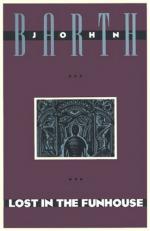|
This section contains 6,312 words (approx. 22 pages at 300 words per page) |

|
SOURCE: "Funhouse Reflexes: Lost in the Funhouse," in A Reader's Guide to John Barth, Greenwood Press, 1994, pp. 51-65.
Bowen is an American educator, critic, and editor who frequently writes on James Joyce and the literature of the Irish Renaissance. In the following essay, he argues that in Lost in the Funhouse Barth associates the problems of identity with the difficulties of composing fiction, identifying the maturation of the protagonist—in all his various guises—with the development of the collection's story line and major themes.
Lost in the Funhouse has a lot of James Joyce in it. Jan Marta, among others, has long recognized the self-referentiality in the two halves of the book as resembling both the Küntstlerroman and Bildungsroman prototypes of Portrait ["John Barth's Portrait of the Artist as a Fiction: Modernism through the Looking-Glass," Canadian Review of Comparative Literature 9, no. 2 (June 1982)]. However, Barth's volume of...
|
This section contains 6,312 words (approx. 22 pages at 300 words per page) |

|


